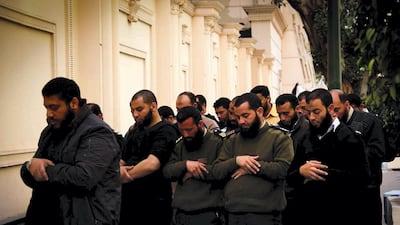Cairo judges ended six years of legal wrangling on Wednesday over a 2012 police ban on facial hair for officers, ruling against the right of individual officers to sport long beards.
The decision confirmed the government’s interest in maintaining the police force as a “secular organisational entity”.
In Egypt, an untrimmed beard on a man’s cheeks and chin with the upper lip clean-shaven is popularly understood as a signifier of Salafi religious beliefs or political allegiance to the Muslim Brotherhood.
Several hundred police officers started growing wilder beards when enforcement of the ban loosened during the one-year presidency of Muslim Brotherhood leader Mohammed Morsi, which lasted from June 2012 to July 2013. The army, then headed by Egypt’s current leader Abdel Fattah El Sisi, removed Mr Morsi from power after massive protests against his divisive rule.
This week’s ruling by the Court of Urgent matters overturned a July 1 finding by the lower court allowing bearded officers to rejoin the force if they trimmed their facial hair in compliance with Interior Ministry regulations.
In their July ruling, administrative court judges said they were basing their decision to reinstate officers solely on the grounds of employment law.
“The beards may show affiliation with banned political and terrorist organizations,” wrote Judge Mohamed Maher Abul-Enein. “But the government's filing does not show, any act or statement that proves this, and it would have been more useful to the court for the Ministry of the Interior to reveal them.”
But the court ruled that the need to abide by regulations was an overriding state interest holding greater weight than personal freedom or religious preferences.
“The return of bearded officers to the employment by Ministry of the Interior violated the constitution’s definition of Egypt as a civil state and constituted a danger to Egyptian society and these men are a threat to national unity and social peace,” said Mohammed Hamid Salem, the attorney who brought the case before the Urgent Matters Court.
“Some of these officers have religious affiliations that led them to participate in the execution of terrorist acts.”
A July verdict by a Cairo military court is cited to validate Mr. Salem’s allegations that the ranks of the bearded policemen include terrorist elements.
___________
Read more:
Egypt jails Lebanese woman after harassment claim video
___________
Hani Shukri, a 43-year-old former spokesman for the bearded officers' organisation, was found to have planned an August 2016 ambush by gunmen at a security checkpoint in Monufia – a governorate north of the capital.
The army jailed Shukri on terror charges for the incident that resulted in the deaths of two policemen and injuries for five others, including two civilians.
But Osama Yaheya, a 33-year-old former police major from the Delta governorate of Sharqiyah, rejects the notion that all policemen should comply with the ban just because some harbor extremist sympathies.
"The January 2011 Revolution gave all citizens personal freedom which should include choosing which Islamic practices a man follows,” said Mr Yaheya, who was dismissed from the force in February 2012 after growing a long beard. “It did not affect my work performance nor my loyalty to the laws of the state.”
Muslim scholars have long debated the significance of facial hair as a sign of piety.
In 2013, Ali Gomaa, then Egypt’s Grand Mufti, issued a fatwa that neither growing a beard nor shaving it off is related to Sharia law.
Sheikh Gomaa’s fatwa relied on the scholarship of Mahmoud Shaltout, Grand Imam of Al-Azhar during the Nasser years who ruled that “everything relating to clothing and physical appearance, including beards and shaving is a habit that should be adopted to one’s living environment”.
Sheikh Gomaa has long topped the Muslim Brotherhood’s hit list of moderate clerics, army and judicial officers, according to Khaled Al Balshy, head of the Giza General Investigation Directorate.
He has survived three assassination attempts, most recently in August 2016 when two masked gunmen opened fire as he was walking toward the Fadel Mosque in the suburban Cairo Sixth of October neighborhood.
“The issue here is not whether the officers in question were complicit in violent attacks on Egypt,” said Youssef Chouhoud, assistant professor of political science at Christopher Newport University in Virginia, USA.
“What the state is arguing is that simply by dint of growing a long beard they are professing allegiance to an unsanctioned ideology,” he continued.

